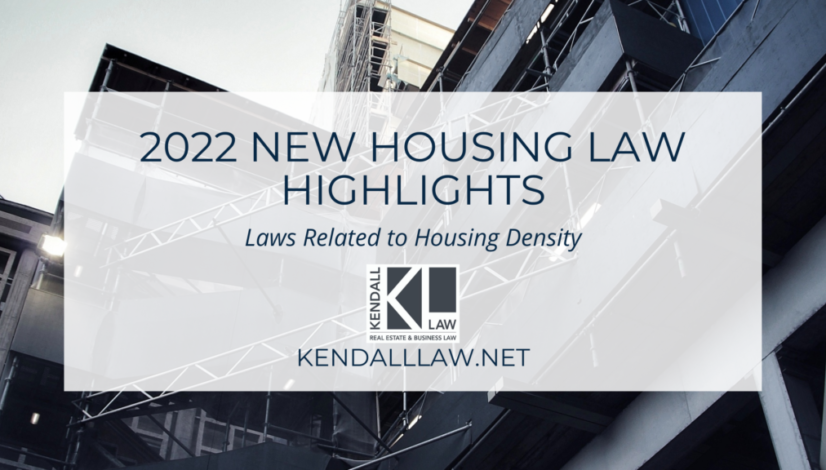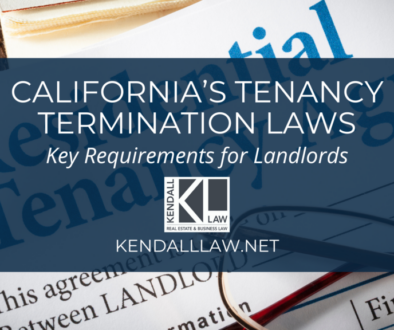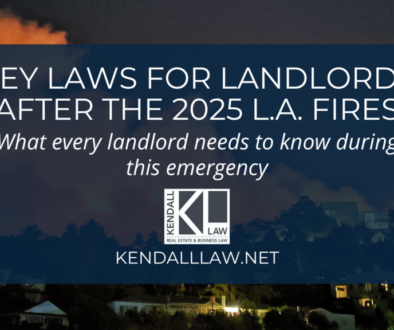2022 New Housing Law Highlights: Laws Related to Housing Density
Effective January 1, 2022, there are a number of laws that impact housing development, density, planning and rental housing. Kendall Law has provided some of the highlights of these laws and how they impact real estate professionals, landlords, tenants, property managers, housing developers, real estate investors and property owners.
LAWS AFFECTING DENSITY
SB 9 Conversion on Single Family to Duplex/Lot Splits
Senate Bill 9 provides for ministerial approval for converting existing homes occupied by homeowners into a duplex if certain eligibility restrictions are met. Also allows a single-family home lot to be split into two lots, and a duplex built on each lot, provided that the initial home is occupied by the owner who will attest to continue to live in the home as primary residence for at least three years.
There are exceptions: 1) the property could not have been used as a rental for the past three years, 2) the property cannot already have an accessory dwelling unit or junior ADU, 3) the new lot may not be less than 40 percent of the property and must be at least 1,200 square feet, 4) modifications to the existing home may not require the demolition of more than 25 percent of an exterior wall, and 5) neither the new duplex nor the lot split with up to four new units (a duplex on each) may not result in a significant adverse impact to the physical environment
SB 10 10-Unit Zoning
Senate Bill 10 provides that if local agencies choose to adopt an ordinance to allow up to 10 dwelling units on any parcel within a transit-rich area or urban infill site, the rezoning will be exempt from environmental review of CEQA.
SB 290 Amendments to the State Law Density Bonus Law
Senate Bill 290 is an amendment to previously enactedState Density Bonus Law (SDBL) which grants bonuses, concessions, waivers and parking reductions to projects with qualifying affordable housing. It is a commonly used tool to increase housing production.
The amendments do the following:
- Clarify that the SDBL more broadly applies to projects with for-sale housing by replacing prior references to “common interest developments” with references to for-sale housing.
- Provide that when determining the required percentage of units that must be affordable in order to qualify for SDBL benefits, the “total units” or “total dwelling units” excludes the units added pursuant to the SDBL or a local law granting a greater density bonus and includes the units designated to satisfy local inclusionary zoning requirements.
- Provide that an impact on the physical environment is no longer an appropriate basis for denying a concession or incentive, aligning the SDBL with the Housing Accountability Act’s (HAA) basis for denying or reducing the density of a qualifying housing development project.
- Impose a new parking maximum of 0.5 spaces per bedroom for a development that includes 40 percent moderate income, for-sale units and is within a half-mile of a major transit stop to which residents have unobstructed access.
SB 728 Purchase of Density Bonus Units by Non-Profit Housing Organizations
In connection with for-sale density bonus units that qualified a developer for an award of the density bonus under the State Density Bonus Laws, Senate Bill 728 requires that such unit be either: 1) initially occupied by a person or family of the required income, offered at an affordable housing cost and subject to an equity sharing agreement, or 2) purchased by a qualified nonprofit housing organization receiving a property tax welfare exemption. For option 2, a recorded contract must memorialize: a) affordability restrictions for at least 45 years, b) an equity sharing agreement and c) a repurchase option that requires a subsequent purchaser desiring to sell or convey the property to first offer the nonprofit corporation the opportunity to repurchase the property. This creates more ownership options for nonprofit housing organizations.
SB 478 Minimum FAR/Lot Coverage Standards and Prohibition on CC&R Restrictions of FAR for Missing Middle Multifamily Housing
FAR (floor area ratio) is used in local zoning codes to limit the total floor area of a building in relation to the square footage of a lot. 478 prohibits agencies from imposing a FAR of less than 1.0 for a housing development project consisting of three to seven units and a FAR of less than 1.25 for a housing development project consisting of eight to 10 units.
An agency cannot deny a housing development project located on an existing legal parcel solely on the basis that the lot area does not meet the agency’s requirements for minimum lot size.
To qualify, a project must consist of three to 10 units in a multifamily residential zone or mixed-use zone in an urbanized area and cannot be within a single-family zone or within a historic district. SB 478 also makes any private development CC&R void and unenforceable if it effectively prohibits or unreasonably restricts an eligible FAR.
AB 345 ADU Separate Conveyances – Low-Income/Moderate Income Built by a Qualified Non-Profit
Assembly Bill 345 removes the requirement for a local agency to first pass an ordinance allowing the conveyance of an ADU separately from a primary residence before such a conveyance occurs and person an ADU to be sold or conveyed separately from the primary residence to low to moderate income individuals and families.
This law is only applicable to properties where the primary residence or ADU was built by a qualified nonprofit corporation and that the property is held pursuant to a recorded tenancy in common agreement. In addition to the current requirements, agreements recorded after Dec. 31, 2021, must also include: 1) a delineation of all areas of the property that are for the exclusive use of a cotenant, 2) delineation of each cotenant’s responsibility for the costs of taxes, insurance, utilities, general maintenance and repair and improvements associated with the property, and 3) procedures for dispute resolution among cotenants before resorting to legal action.
The nature of these bills will inevitably lead to serious questions and complex legal matters. Here at Kendall Law, we specialize in handling complex real estate and legal matters.
For more highlights of new housing laws in 2022, see also:
LAWS RELATING TO RENTAL HOUSING
LAWS RELATED TO HOUSING DEVELOPMENT, CC&Rs AND EQUITY
Contact Kendall Law for answers to your legal questions regarding these new laws. Contact us or call (310) 619-4941.
Author: Eileen Kendall





